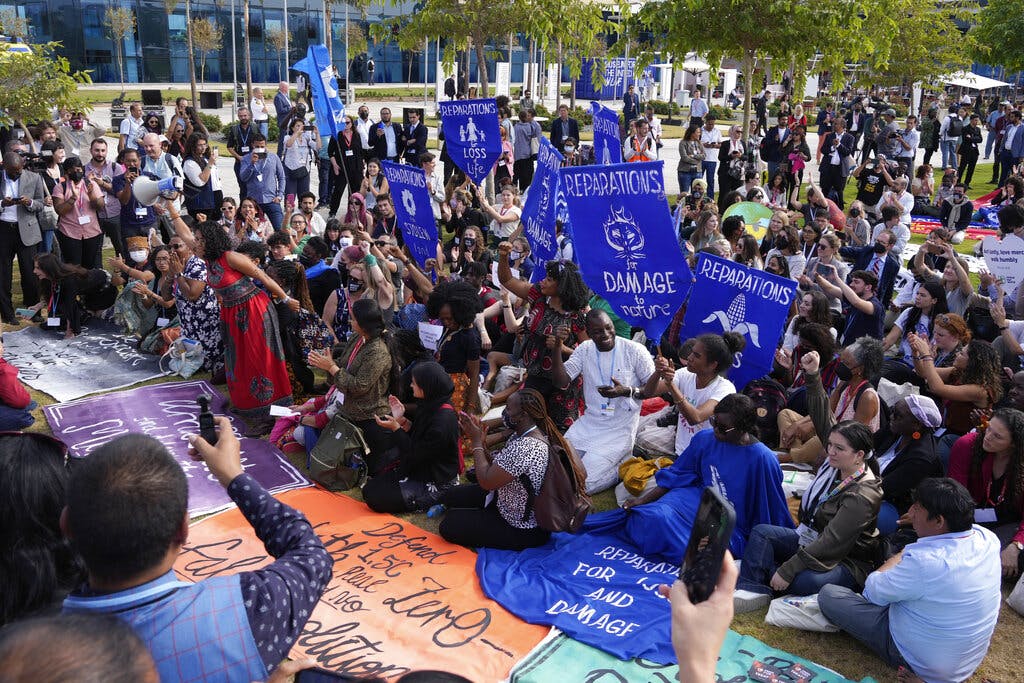Mugged at Sharm el-Sheikh
America’s taxpayers are being set up to foot the bill for a climate reparations scheme, courtesy of the Biden administration.

The big news so far from the UN climate-klatch at Sharm el-Sheikh is that the Biden administration is dropping its objections to a scheme “to compensate poor, developing countries for climate damage,” as the New York Times puts it. For years, America opposed this boondoggle due to “concern that it could face potential liability” for past carbon emissions, the Times says. Now America’s taxpayers are being set up to foot the bill.
The Times’ report today quotes an unnamed Biden White House official who says America is “working to sign on to a deal” and that “negotiations were ongoing.” The upshot, in the Times’ telling, is that America will drop its opposition to a fund for “loss and damage” — purportedly caused by climate change — that will help the poorest nations “cope with ongoing disasters such as storms, floods and drought.”
These poor nations — “largely from Asia, Africa, Latin America, and the Caribbean and South Pacific,” the Times writes — “see the matter as one of justice,” as “they did little to contribute to a crisis that threatens their existence.” The American capitulation to the fund follows haranguing by climate activists and the UN chief, Antonio Guterres. He warns the world “is on a highway to climate hell” and rich nations “bear a moral responsibility” to help.
Pressure was also placed on America by the European Union, which agreed to support the “loss and damage” slush fund “as long as the donor base of contributing nations was broadened,” the Financial Times reports. America’s initial failure to jump on the EU proposal was seen as “stark” by green activists, who derided the “deafening silence.” Yet the EU seeks buy-in, too, from “the biggest emitters,” Germany’s foreign minister says.
That suggestion is directed toward Communist China — “the world’s worst polluter,” the FT notes — which opposes contributing to any fund. Both America and Europe want China not only to agree to ante up for the climate fund, the Times says. They also want “assurances” that Beijing “would not be eligible to receive money from it.” Right now, China is still considered a “developing country” by the UN.
For years, Beijing — despite its growing prosperity and status as the world’s second-largest economy — has used that designation to take advantage of global trade policies. Keeping the label lets China keep its tariffs high and its government industrial subsidies intact, giving it a leg up in the global trade war with America and other developed countries. Good luck getting Beijing to give up that status over the climate “loss and damage” fund.
Another idea mooted at the climate parley is to “overhaul” the World Bank and the International Monetary Fund, the Times reports, turning them into funding vehicles “to handle a new destructive force: global warming.” The Times says “proposals are gaining traction” with “heads of state, finance ministers, and even leaders of the bank and fund.” If this is true, it reflects the left-wing institutional capture of these organizations.
One voice of reason at the climate parley was Prime Minister Johnson, the Conservatives’ former leader, who noted the pressure on Britain for having “put a lot of carbon in the atmosphere.” He noted, too, the impossibility of making “up for that with some sort of reparations,” citing lack of “financial resources.” He urged countries to “look to the future” and develop “technological solutions.” That’s a better solution than payouts from the West.
That’s because climate reparations — global welfare — won’t help the developing world. The best way to aid the poorest nations is to promote the foundations of Western prosperity: the rule of law, private property, sound money, and respect for human rights. In the developing world, such qualities are lacking. Fostering them would unlock these nations’ potential, and help them ward off climate disruption — at no cost to American taxpayers.

